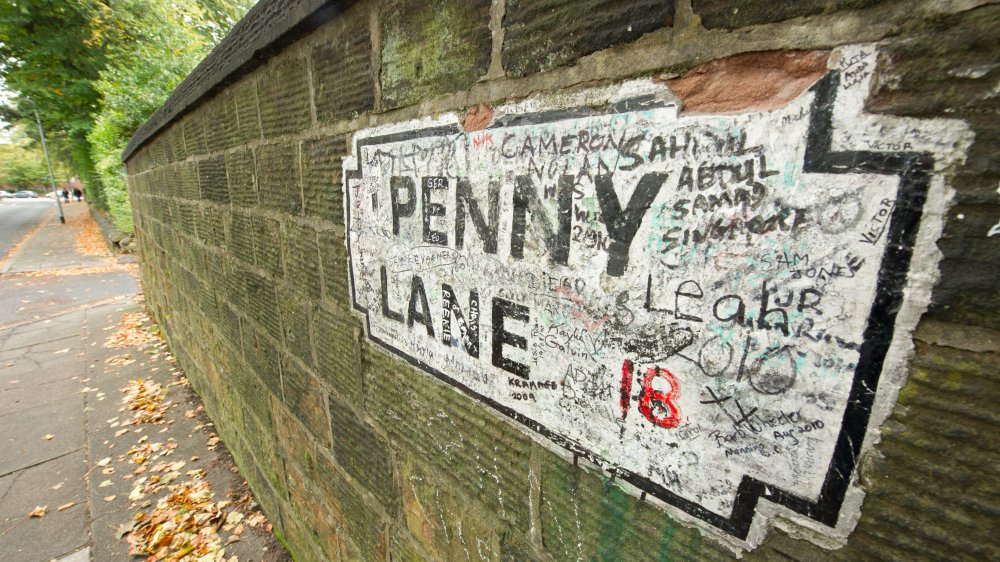The True Story Behind Penny Lane Lyrics
Origins of the Phrase “And How!”
You may not be familiar with the old slangy phrase “and how!” which was commonly used in older Hollywood movies from the 1930s and 1940s, though it dates back even further to the 1860s. This phrase is used to strongly agree with or emphasize how true something that has just been said really is. For example, if one person said “Jackie really loves ice cream,” the response would be “And how!” implying the words “and how [much she does]!” The phrase is rarely heard today but was still in somewhat common use when The Beatles song “Penny Lane” was written in 1967. In the lyrics, George Harrison sings “You know I believe, and how!” to intensify that he truly believes whatever is being referred. This was an unconventional usage of the phrase as it was usually an immediate reaction by one person to what another person said.
The “Hildas” Fish and Chip Shop
The fish and chip shop mentioned on Penny Lane was actually owned by John Lennon’s friend Harold Walmsley’s parents, Hilda and George Woods. They ran a shop called “Hildas” which was located on Penny Lane in Liverpool. Hilda and George offered local children a special deal - if they were shorter than the counter, they could get a cone of chips and a “fish and finger pie” for only six pence. Amusingly, the children would crouch down to try and obtain this bargain. A “fish and finger pie” was scraps of fish placed between two slices of fried potato coated in batter. It’s thought John Lennon wrote this reference to Hildas into the lyrics after attending school with Harold. Sadly, when Paul McCartney was later asked about the meanings, he incorrectly attributed it to something lewd rather than the genuine family business.

More Details on the “Hildas” Fish and Chip Shop
Harold Walmsley confirmed that his mother Hilda, along with his father George Woods, owned and ran the famous “Hildas” chip shop that was name-dropped in the Penny Lane lyrics. Harold’s daughter, my mother Norma Woods, shared further interesting details with me.
The Special Children’s Deal
The chip shop offered a generous deal for local kids - a cone of chips and fish finger pie for only six pence, if they were shorter than the counter. This led to the amusing sight of children crouching low as they entered, hoping to sneak the bargain. It was a clever promotional tactic that brought in plenty of young customers over the years.
Recipes from the Chip Shop
According to my mother, her grandparents George and Hilda were very proud of their chip shop recipes. The batter for the fish finger pies and other fried items was created with a specially-guarded mix of herbs and spices. Even decades later, my nan could recreate the unique flavors that made Hildas such a hit with customers young and old.
A Real Family Business
Under the watch of Hilda and George, the chip shop became a cornerstone of the tight-knit Penny Lane community. My great-grandparents worked tremendously hard to support their growing family through long hours at the fryers. It was very much a family affair, with various children and even neighborhood kids pitching in where needed.
The Inaccurate “Lewd” Attribution
Sadly, in one interview years after The Beatles split, Paul McCartney was asked about the meaning behind the “Penny Lane” lyrics. He incorrectly suggested the “fish and finger pie” reference may have carried some kind of lewd double entendre.
Setting the Record Straight
However, Harold Walmsley and my mother Norma Woods insist there was never any untoward connotation - it was purely about the legitimate food item sold at my great-grandparents’ venerable chip shop. Norma said her nan Hilda surely would have been mortified by Paul’s misguided statement. Thankfully, the real story of the honest family business has now been set straight.
A Cherished Piece of Local History
While the original “Hildas” fish and chip shop long since closed its doors, it remains a cherished piece of history for the Penny Lane community. The small business touched countless Liverpool lives over decades, from the children grabbing bargains to the families feeding busy working hours. Even worldwide Beatles fans now connect the shop to one of the band’s most iconic songs. Most remarkably of all, a genuine family recipe achieved immortality through casual lyrics. It’s a true testament to the meaning local institutions can hold.
